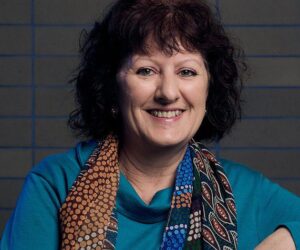The members are:
- ABC Education (ABC)
- Australian Centre for the Moving Image (ACMI)
- Australian Library and Information Association (ALIA)
- Museum of Australian Democracy (MoAD)
- National Film and Sound Archive of Australia (NFSA)
- National and State Libraries Australasia (NSLA)
- Queensland University of Technology (QUT)
- Special Broadcasting Service (SBS)
- Western Sydney University (WSU)
ACMI (formerly Australian Centre for the Moving Image) explores the power of media and culture on screen – fostering the next generation of makers, players and watchers. ACMI’s exhibitions, screenings, commissions, festivals, and industry and education programs reveal the stories, technologies and artists that create our shared screen culture.
The Australian Broadcasting Corporation is the national broadcaster which has a remit within its charter to educate all Australians. It has a long history of providing educational materials to Australian schools and families. In 2018, ABC Education introduced Australia’s first Media Literacy Week.
The Australian Library and Information Association is the peak body for school, public, tertiary and other libraries. Libraries have always been a rich source of quality information, today they also play a vital role in bridging the digital divide. It supports 5,000 member organisations which are made up of libraries and information services.
The Digital Media Research Centre at Queensland University of Technology conducts world-leading research for a creative, inclusive and fair digital media environment.
The Institute for Culture and Society at Western Sydney University researches transformations in culture and society in the context of contemporary global change. It champions collaborative engaged research for a globalising digital age.
The Museum of Australian Democracy at Old Parliament House helps people to understand Australia’s social and political history by interpreting the past and present and exploring the future. In 2019 it opened the new permanent exhibition Truth, Power and a Free Press.
The National Film and Sound Archive of Australia is the nation’s living’ archive of audio-visual materials, a provider of media literacy education for students and lifelong learners, and a destination for deep engagement with Australian media culture based on its collections which are a rich resource for fostering critical perspectives on the media.
National and State Libraries Australasia is the peak body for the national, state and territory libraries of Australia and New Zealand. Its member libraries are jointly responsible for collecting and providing access to our documentary heritage, including electronic publications and websites, and are trusted providers of information services.
The Special Broadcasting Service is Australia’s multicultural and multilingual broadcaster. SBS inspires all Australians to explore, respect and celebrate our diverse world and in doing so, contributes to an inclusive and cohesive society.
The AMLA advocates for the use of its media literacy framework to design media literacy learning opportunities and resources. This framework is guided by six key concepts that can be used to define the scope of learning and it proposes ten competencies that establish the purpose of media literacy.

